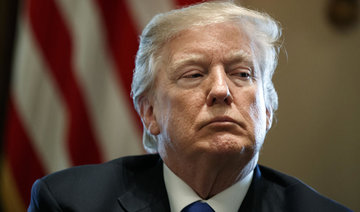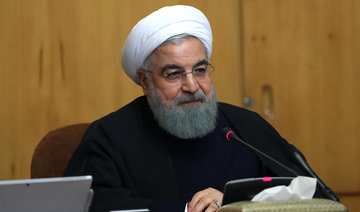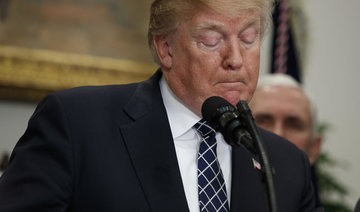TEHRAN: Even with President Donald Trump continuing to waive nuclear sanctions, Iran’s economy remains hobbled by US restrictions but some diplomats in Tehran remain quietly confident for the future.
The real problem in Iran right now, everyone in the international business community agrees, is uncertainty.
That was not helped by Trump’s announcement on Friday that he would waive nuclear-related sanctions, but only once more and that Europe must work with Washington to “fix the deal’s disastrous flaws, or the United States will withdraw.”
“No one has any idea what’s going on. Trump has introduced so many layers of uncertainty,” a Western trade official in Tehran told AFP on condition of anonymity.
“That’s not necessarily negative. Things could actually improve if Trump pulls out of the deal. The Europeans could stay and the EU could provide protections for its industries against US sanctions,” he said.
“Or things could get even worse. We just don’t know.”
On the surface, Trump’s vitriolic stance appears disastrous for the 2015 nuclear deal between Iran and world powers, which lifted many sanctions in exchange for curbs to the country’s nuclear program.
Even as he confirmed the waiver of nuclear sanctions on Friday, Trump added yet more sanctions related to human rights and Iran’s missile program, adding to a vast web of restrictions that have scared off many Western companies.
Major foreign banks have been particularly cautious of re-entering Iran, dreading a repeat of the record-breaking $8.9 billion penalty levelled on France’s BNP Paribas for breaching US sanctions on Iran and other countries.
There seems little hope of hitting the government target of $50 billion in foreign investment per year, with the government saying less than $3.4 billion was achieved in 2016.
But European diplomats say a lot is happening behind the scenes.
Deals for things like industrial equipment, solar parks and dairy farms have been quietly building over the past two years.
“I’m still cautiously optimistic,” said a European diplomat.
“Many firms have invested so much they can’t pull out. They will find a way to make it work whatever Trump does.”
The big difference under Trump is secrecy.
“Deals are going on in complete silence. There’s no advantage to discussing it. Many have interests in the US or an American investor. They don’t want to make themselves a target,” said the Western trade official.
Some bigger firms — particularly the French — have been less coy.
French energy giant Total signed a $5 billion gas deal in June, while carmakers Peugeot and Renault have already reopened production lines.
Italy pointedly announced a $6 billion credit line for development projects just days before Trump’s latest attack on the deal.
“The divide between Europe and the US is widening. It’s been more than a year that President Trump is trying to undermine this deal but he’s basically failing,” said Farid Dehdilani, international affairs adviser for the Iranian Privatization Organization.
Nonetheless, the initial excitement that accompanied the nuclear deal has evaporated.
“I was working in the stock market when the deal was signed, and we were so excited and hopeful, but when I check with friends in brokerages now, nothing is happening,” said Tehran-based economic analyst Navid Kalhor.
“The only sectors that get any interest are commodities: oil, mining, petrochemicals. But oil money cannot solve all our problems,” he said.
Iran’s return to international oil markets helped propel its economic growth rate to more than 12 percent last year, but unemployment remains huge and the energy sector can only create few jobs at a time.
“Look at the protests — ordinary people are not optimistic about the future,” said Kalhor, referring to the deadly unrest that rocked dozens of Iranian cities over the new year, sparked by anger over unemployment and poor governance.
“We need better and more reliable trade partners, and more access to international markets. We are mostly borrowing money rather than attracting investment. This can cause more problems in future when we have to service our debts. It’s a vicious circle,” he added.
The problem, many Iranians are quick to emphasise, does not lie just with Trump.
Years of mismanagement and corruption would make Iran a tricky investment destination even without US antagonism.
“We have to facilitate foreign investment by eliminating unnecessary bureaucracy: the three or four months needed to get permits, for instance,” said Dehdilani.
“In the end, the success of the nuclear deal relies on Iranians.”
Iran economy faces ‘layers of uncertainty’ after Trump statement
Iran economy faces ‘layers of uncertainty’ after Trump statement

Closing Bell: Saudi main index climbs to 10,485

RIYADH: Saudi Arabia’s Tadawul All Share Index edged up on Sunday, gaining 34.32 points, or 0.33 percent, to close at 10,484.59.
The total trading turnover of the benchmark index stood at SR2.59 billion ($690 million), with 168 listed stocks advancing and 87 declining.
The Kingdom’s parallel market Nomu also gained 100.37 points to close at 23,454.65.
The MSCI Tadawul Index advanced by 0.13 points to 1,377.44.
The best-performing stock on the main market was Nama Chemicals Co., whose share price increased by 9.98 percent to SR22.38.
The share price of Al Masar Al Shamil Education Co. rose by 9.15 percent to SR23.85.
Saudi Paper Manufacturing Co. also saw its stock price climb by 8.42 percent to SR57.95.
Conversely, the share price of Canadian Medical Center Co. dropped by 6.37 percent to SR6.03.
The stock price of Kingdom Holding Co. also declined by 3.16 percent to SR8.28.
In the parallel market, Alfakhera for Mens Tailoring Co. was the top performer, with its share price advancing by 16.40 percent to SR8.80.
On the announcements front, Theeb Rent a Car Co. said it had signed a long-term vehicle leasing services contract valued at SR110.4 million with Hungerstation Co.
Under the deal, Theeb will lease 2,000 vehicles to HungerStation for a period of four years starting from 2026, according to a Tadawul statement.
The statement added that the vehicles will be delivered in batches within the first six months from the contract start date, taking into consideration global logistical circumstances and procedures beyond the control of both the agents and the company.
The contract is expected to have a positive impact on the company’s financials from the first quarter of 2026.
The share price of Theeb Rent a Car Co. declined by 0.79 percent to SR37.80.














